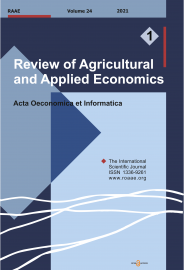KEYWORDS:
elasticities; food expenditure; food system; QUAIDS; urban households
DOI NUMBER:
10.15414/raae.2021.24.02.20-27
ABSTRACT:
Research background: The food system is central to a wide range of outcomes such as food security, nutrition and economic development. In this wise, the food systems must meet the needs of a growing and increasingly urbanized population. However, food system in developing countries is undergoing a rapid transformation towards high value products and food safety. Yet, the consumer demand drive towards the transformation has received much less attention. Hence, improvement in the agricultural and food systems must be viewed in the context of household food consumption patterns.Purpose of the article: This paper examined household food demand and food choice preferences among urban households in southwest, Nigeria. Understanding Nigeria’s Agrofood structure through urban eating pattern will proffer knowledge required for better policy design and implementation.
Methods: The paper applies a quadratic almost ideal demand system (QUAIDS) model to a cross-sectional household survey data from two urban areas, and estimate price and expenditure elasticities as indicators of household sensitivity to market shocks.
Findings & Value added: Analysis of frequency distribution on urban household’s preferences shows that convenience, availability, safety were important attributes influencing decisions to purchase foods. Demand estimations show positive expenditure elasticities for food groups with values close to unity. The animal-source foods and cereals were more expenditure-elastic in high urban areas (HUA) and low urban areas (LUA), respectively. All own-price elasticities are negative and LUA are more price-sensitive to most food groups compared to HUA. The price and expenditure results suggest that transformation of agro food products will come in place if convenience and food safety attributes are incorporated in food value chain.
Please Cite this Article as:
Adesola Adebola IKUDAYISI (2021) The Agrifood System Transformation In Nigeria: Insights From A Household Food Demand Model. Review of Agricultural and Applied Economics. Advance online publication. doi: 10.15414/raae.2021.24.02.20-27
URL for sharing:
https://roaae.org/1336-9261/doi/abs/10.15414/raae.2021.24.02.20-27
FULL TEXT PDF:
▼ direct download link| view online in fullscreen ▲

